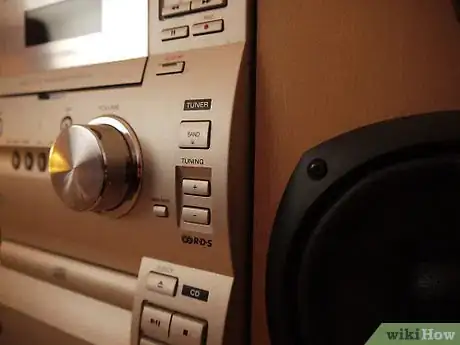X
wikiHow is a “wiki,” similar to Wikipedia, which means that many of our articles are co-written by multiple authors. To create this article, 33 people, some anonymous, worked to edit and improve it over time.
This article has been viewed 77,792 times.
Learn more...
From cultural motivations and economic factors to wanting to flirt in a foreign tongue, learning a second (or third, or fourth) language comes with countless benefits. Follow these steps and you should be able to set out on the right path for mastering your target language, be it Spanish, French, English, Russian, Mandarin, Swahili, or even Urdu.
Steps
Part 1
Part 1 of 3:
Using Media
-
1Listen to the radio. Listening to a radio show or even music broadcast in the respective language is a fantastic way of tuning your ears in to the language's phonetics. Many radio apps can be downloaded from app stores or the internet on multiple devices and many are free of charge, meaning you have access to a host of genres and channels to suit your interests. If you're after a developing a richer vocabulary and more creative use of language, you may be interested in old radio theatre programs and audiobooks, which focus on listening as an art form and means of entertainment.
- Whether you're taking the tube home from work, or doing some gardening, hearing conversations in the target language is one of the best things you can do to accustom yourself to the subtleties, colloquialisms, and rhythms.
-
2Read, read, read. Picking up a weekly edition of a newspaper or magazine in the target language - 'Le Monde', 'Correre della serra' or 'Der Spiegel', for example - is one of the best methods for picking up new vocabulary and reinforcing your grasp of already-learnt vocabulary. As well as increasing your feel of the structure of the language and the use of different lexis, it will provide you with a culturally interesting experience by reading around the current affairs of the country; something which is an integral part of foreign language learningAdvertisement
-
3Watch films, TV, lectures, instructional videos; listen to music. Arguably one of the best activities that is open to you when learning a new language, watching films and listening to music at a comfortable pace in the target language (with or without subtitles, depending on your ability) can help your vocabulary to develop and help you to understand conversational conventions in the respective language. Take note of words or phrases which you do not know the meaning of, then learn them afterwards. TV series are also a great way of doing this, especially if they appeal to your sense of humour (assuming you have one!)
-
4Learn some country-specific political and cultural terms. In most of the written articles or TV shows you’ll find plenty of words such as “Tories”, “10 Downing street”, “GOP”, “l'Élysée”. Be curious and find out what is behind a phrase or title, e.g. British prime minister, French president. Try to learn at least a few names of famous people in that country: the name of the leader, a few names of sportsman/sportswoman, and so on.
Advertisement
Part 2
Part 2 of 3:
Interacting with Others
-
1Phone a friend. Having a friend who is like-minded in your motivation to master a foreign language can be a great opportunity to improve both yours and his/her grasp. To begin with, an hour of conversation a day, slowly increased to two hours, then three hours and so forth will gradually accustom your brain to switching into the foreign language and getting your head around its grammar, vocabulary, and sounds. Better still, if you have a family member or friend who can fluently speak your respective language, take advantage of this!
-
2Learn to greet, apologize and thank people in the second language. A simple 'Hello' in the local language will find people willing to look in your direction. You can further your conversations while at the same time enacting your most important need. Apologizing to someone is another technique that will help in the long run when you are at a foreign destination. Learn a few short words that may help you. And finally, learn to bid a cheerful goodbye in your second language.
Advertisement
Part 3
Part 3 of 3:
Engaging with the Language Daily
-
1Think. Pensez. Denken. No matter how many different methods people choose to become fluent in their target language, the almost universal opinion is that when you feel like you are 'thinking' in the language, this is a definitive mark of success. Making a significant effort to 'say' things in your head throughout the day in the target language is a brilliant way of getting cognitively used to articulating your thoughts in the language. If you are at a beginner-intermediate level, try thinking of the equivalent for each thought, desire or opinion you have in the foreign language; this will prepare you for complete mastery.
-
2Write it down. Keep a diary in the foreign language and add in entries every day (with a foreign dictionary), roughly a page long so as to improve your written skills in the language. Alternatively, you could arrange to converse via email or letters to a pen-pal/family friend who speaks the language, which is one of the most agreed upon methods of mastering the foreign tongue.
-
3Visit the country. Visiting the country where your target language is spoken will not only help you be fully exposed to the language but it will also allow you to learn the culture of that country. Through exposure, you can learn which is the most popular sport, how the traditional food tastes, and more.
Advertisement
Community Q&A
-
QuestionIs it more important to master a few languages or to learn multiple languages at an intermediate level?
 EchomochaCommunity AnswerIt's not a matter of what's important, but rather choosing a plan that suits your style of learning, and what you desire to achieve in learning another language.
EchomochaCommunity AnswerIt's not a matter of what's important, but rather choosing a plan that suits your style of learning, and what you desire to achieve in learning another language. -
QuestionI'm a native English speaker, and I would like to learn Danish. It can be difficult to pronounce words due to the differences in phonics and stresses. Is there something I can do to help?
 Community AnswerTry to speak to native speakers and watch videos in that language. Correct pronunciation comes when you're constantly exposed to the correct accent. You'll start noticing even tiny differences and you'll subconsciously adjust to what you're hearing.
Community AnswerTry to speak to native speakers and watch videos in that language. Correct pronunciation comes when you're constantly exposed to the correct accent. You'll start noticing even tiny differences and you'll subconsciously adjust to what you're hearing.
Advertisement
About This Article
Advertisement




























































